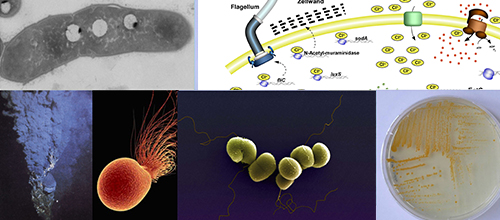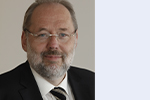- GU Home
- Faculties
- Institutes and Facilities
- Research Interests
- Abteilungen
- Molecular Microbiology and Bioenergetics
Molecular Microbiology and Bioenergetics

Bacteria and archaea adapt to the changing conditions of their environments by a multitude of different mechanisms that ensure survival. Thus, for example, their cellular processes even change at the onset of rain. Using a variety of methods, professor Volker Müller and his team analyze the strategies used by salt-loving (halophilic) microorganisms, such as the bacterium Halobacillus halophilus, to adapt to life at high salinities. Their methods range from functional genome analysis to biochemical analysis of the function of proteins to elucidate how the salt signal is perceived, how it is transmitted in the cell to the different targets such as enzymes, transporters and activators or repressors of gene expression. They discovered that cells measure the salt content of their environment by assessing the chloride concentration, and then adjusting their regulatory mechanisms accordingly. The cells produce intercellular substances (solutes) that are compatible with their metabolism and thus protect themselves against water loss. Ectoine, for example is one of the solutes formed; it is an amino acid derivative that also protects human skin against moisture loss. For the last ten years, ectoine has been used by the cosmetic industry. Müller also tests other amino acid derivatives for possible applications. In addition, his team studies the physiology, biochemistry and bioenergetics of acetic acid producing (acetogenic) bacteria – a unique group of organisms that use a special ancient pathway to fix carbon and conserve energy in the process – to test them for their contribution in producing fuels such as ethanol from the greenhouse gas carbon dioxide. While analysing the metabolic pathways of these anaerobic, acetogenic bacteria, Müller discovered a hitherto unidentified electron transfer chain in these bacteria in 2010. In these bacteria, and evidently in many other prokaryotes, an enzyme complex (Rnf-Complex) transports sodium ions through the cell membrane, and not, as for example in methane producing archaea, which employ a sodium-pump that is driven by a methyl group transfer – and which Müller had also previously discovered. "In the future," Müller explains, "we would like to have a better understanding of the principles underlying these cells' ability to conserve energy and simultaneously fix carbon dioxide. Moreover, we want to understand how ATP synthase enzymes produce high-energy ATP (adenosine triphosphate) molecules." His group also explores the biotechnological potential of these bacteria as a production platform for chemicals from carbon dioxide. Müller wants to develop his students' interest in microbiology with his vividly illustrative teaching - for example, in the "Molecular Biosciences" Master's Programme.
Brief Biography

Subsequent to completion of his course of studies in biology, Volker Müller received a doctorate in microbiology in Göttingen in 1987. From 1989 to 1990 he spent two years as a postdoctoral researcher at the Department of Molecular Biophysics and Biochemistry at Yale University, U.S.A. Back at the University of Göttingen, he continued his work on methanogenesis and bioenergetics. In 1994, he received his Habilitation in microbiology. In 1995 Müller received a Heisenberg Fellowship from the German Research Foundation (DFG). In 1997, the Ludwig Maximilians University of Munich appointed him professor of microbiology. He began his research on halophilic microorganisms there. Müller was appointed full professor at the Goethe University Frankfurt in 2003. There, he served as dean, head of the institute, director and board member of research associations. He also serves as scientific advisor to biotech companies. He has received multiple honours and awards for his scientific work. Müller is co-editor of the journal "Applied and Environmental Microbiology" and acts as a reviewer for a number of journals and research organizations.
Contact:
Prof. Dr. Volker Müller
Institute of Molecular
Biological Sciences
Max-von-Laue-Str. 9
60438 Frankfurt am Main
Germany
Telephone: +49 (0)69 798 29508
E-Mail: VMueller@bio.uni-frankfurt.de
www.bio.uni-frankfurt.de
Forschungsverbünde
- SFB 902 - Molekulare Mechanismen der RNA-basierten Regulation
- SFB 807 Transport und Kommunikation durch biologische Membranen
- Exzellenzcluster Makromolekulare Komplexe
- Center for Membrane Proteomics (CMP)
- Interdisciplinary Center for Neuroscience (ICNF)
- Zentrum für Interdisziplinäre Afrikaforschung (ZIAF)
- FOR2251 - Adaptation and persistance of the emerging pathogen Acinetobacter baumannii
- "SE2B" Solar Energy to Biomass - Optimisation of light energy conversion in plants and microalgae
- Studying at Goethe University
- International applicants
- Faculties
- Overview of study programmes
- Programme for refugees
- GRADE
- Goethe Business School (continuing education)
- Research at Goethe University
- Scientific news
- Goethe Welcome Center (for international researchers)
- Collaborative research projects
- Individual research
- Visiting fellowships
- Endowed chairs
- About the University
- News-in-brief
- University administration
- Campus locations
- Campus life
- University archives (German)
- Rhine-Main-Universities





